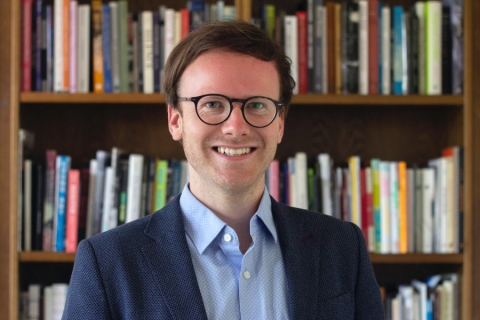Dr. Joe Davies joins the Department of Music as a Marie Sklodowska-Curie Global Fellow
Dr. Joe Davies will join the Department of Music, in conjunction with the new Ph.D. program in History and Theory of Music, as a Marie Sklodowska-Curie Global Fellow. The funding is provided by the European Commission and jointly affiliated with Maynooth University, Ireland (2021–2024). Currently, Davies holds a Lectureship in Music at Lady Margaret Hall, Oxford, and an Irish Research Council Postdoctoral Fellowship at Maynooth University.
“It is an honor to be joining the scholarly community at the University of California, Irvine as a Marie Sklodowska-Curie Global Fellow,” said Dr. Davies. “I much look forward to contributing to UCI’s stimulating research culture and embarking on collaborations with colleagues and students within the Department of Music and across the University more generally.”
Davies’s project, “Rethinking Widowhood: Women, Loss, and Liberation in Nineteenth-Century Musical Culture,” centers on women’s experience of widowhood in musical cultures of the long nineteenth century (c. 1800–1914). While there is a growing body of scholarship on widowhood in the fields of literary studies and cultural history, musicological consideration of this topic has tended to be limited to passing reference amid biographical or documentary work. Davies’s research will address this lacuna in two particular respects: first, by rethinking the ways in which widowhood served as a catalyst for musical and artistic creativity; and secondly, by reconsidering the reception and legacy of widows whose contributions have long been overshadowed by the men in their lives. In doing so, the project will take widowhood as an impetus for developing a new kind of historiography that restores women’s individual agency and artistic integrity to the discourse on nineteenth-century music.
Davies’s research introduces this interdisciplinary framework into the field of musicology. It will establish a new vocabulary for understanding the emotional complexities of widowhood, particularly in terms of what it meant and how it felt to be a widow during the long nineteenth century. The heart of the project will emphasize how women in this period negotiated – both emotionally and creatively – the boundaries between loss and liberation as they redefined their image in the wake of their husband’s death.
As part of the project’s dissemination activities at UCI, Davies will inaugurate an interdisciplinary research network, “Women in Music: Global Perspectives.” Bringing together an international cohort of scholars and practitioners from the UK, Canada, Ireland, and the USA, this initiative will serve as a platform for hosting conferences, guest lectures and workshops, together with a recital series of music by women composers. Through these activities, which will be geared towards a broad audience, the network will offer valuable opportunities to start new dialogues about women’s musical contributions across a range of geographical contexts and to hear music performances that have long been neglected.
Biography
Joe Davies completed his DPhil in Music at the University of Oxford, with a full scholarship from the British Arts and Humanities Research Council. At present, he holds a Lectureship in Music at Lady Margaret Hall, Oxford, together with an Irish Research Council Postdoctoral Fellowship at Maynooth University.
Dr. Davies specializes in the aesthetics and cultural history of nineteenth-century music, particularly that of German-speaking lands. What motivates his research is a curiosity about the relationships between music and its aesthetic, social, and cultural contexts. These interests come together in his first monograph, Schubert and the Gothic (forthcoming with Boydell & Brewer). Taking its cue from the expressive worlds of Schubert’s early Schauerballaden, this study traces the sound of the gothic in contexts that range from the fantastical and the uncanny to the sublime and the grotesque. It does so through a multidisciplinary and multisensory methodology, whereby gothic tropes in Schubert’s songs and instrumental music are studied in relation to those in literary and visual works by such figures as Ann Radcliffe, Friedrich Schiller, E.T.A. Hoffmann, and Henry Fuseli. This approach is designed not only to deepen our understanding of Schubert’s artistic vision, but also to establish new ways of thinking about the relationship between music and other art forms in nineteenth-century culture.
Alongside this project, Dr. Davies is leading a number of international collaborations that emerge from and feed valuably into his research and teaching. Among these is Clara Schumann Studies, a collection of essays that he is editing for Cambridge University Press’s "Composer Studies" series (forthcoming in 2021). This book – the first in the series to address a woman composer – brings together the work of leading scholars from the UK, Canada, and the USA with the aim of developing new analytical and critical approaches to Schumann’s music, and of reappraising her legacy as a performer and teacher. His other collaborative projects include co-editing (with Roe-Min Kok) Clara and Robert Schumann in Context for Cambridge University Press’s “Composers in Context” series; and guest-editing (with Nicole Grimes) a special issue of Nineteenth-Century Music Review, entitled “Clara Schumann’s Legacies.”
Twitter handle: @davies_jjoe

